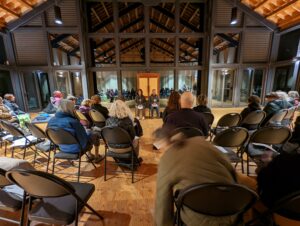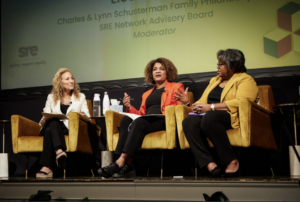For most of Jewish history, our People’s most essential leaders have been rabbis. They have been gatekeepers to Jewish communities, curators and custodians of the Jewish tradition, and the ongoing architects of what Judaism means for every generation of Jews.
 Rabbanut North America is the Shalom Hartman Institute’s answer to the call for a new rabbinate—grounded in pluralism, textual mastery, and moral aspiration. Launched in 2024 as a dynamic model to both recruit rabbis and develop them, the three-year ordination program welcomed 13 individuals into its first cohort.
Rabbanut North America is the Shalom Hartman Institute’s answer to the call for a new rabbinate—grounded in pluralism, textual mastery, and moral aspiration. Launched in 2024 as a dynamic model to both recruit rabbis and develop them, the three-year ordination program welcomed 13 individuals into its first cohort.
Cohort II launched earlier this year with 16 individuals, ranging from early- to senior-career professionals, public intellectuals, and global service leaders, alongside senior Jewish educators and institutional leaders. These future rabbis receive training in the Jewish texts, ideas, and skills they need to lead the North American Jewish community through the challenges of 21st-century Jewish life, Israel, and Jewish peoplehood. Following their first in-person gathering in New York, new cohort members reflected on their initial learning in the program:
We were introduced to a very sophisticated balance between the program as a shared journey and
a sense of solidarity among the cohort, along with an encouragement for each individual to pursue and develop their own path and coherence. – Faustine Sigal, Strategic Advisor to PJ Library and Content Advisor for HBO France for “La Rabbine” (aired on HBO in North America as “Reformed”)
I was fascinated by the deep dive into the history and texts about the evolution of the concept of the rabbi and the notion of rabbinic leadership. – Elan Kogutt, Senior Fellow at the Negotiation and Conflict Resolution Collaboratory at Harvard Kennedy School
I found the [opening retreat] helpful for naming the ways that we both already know how to lead because of our professional experience, and that learning Torah has work to do in us. I loved the question [we were asked], “What does it look like when Torah succeeds?” I will keep asking that framing question. It’s such a core question for me and I loved getting to explore it with others. – Bethany Slater, Executive Director of Claremont Hillel
Through leadership retreats, private spiritual direction, summer residencies in Jerusalem, mentorships, and ongoing coursework, the program cultivates rabbis who will engage with thought leadership, ethical clarity, and textual mastery. Already from the first two cohorts, it’s clear that this program is attracting new people to the profession who want to build their skills to become cutting-edge rabbis, fully equipped to lead communities and institutions.
The students drawn to Rabbanut North America reflect the “untapped well” of future rabbis: medical doctors and
psychologists; law professors and Ivy League academics; technologists and humanitarian workers. Their presence widens our understanding of rabbinic leadership itself. What has struck me most is not the structural innovations, but the effect of bringing together genuinely pluralistic cohorts and treating their ideological and developmental differences as part of their formation. Students describe learning to inhabit tension, not resolve it, as one of the most transformative aspects of their development. – Rabbi Jesse Paikin, Director, Rabbanut North America
 At a moment when Jewish communities are asking more of their rabbis than ever before, Rabbanut North America is a timely, even prescient, response to shape a renewed rabbinate. Together with graduates of Rabbanut Yisraelit – Hartman’s Beit Midrash for Israeli Rabbis – Rabbanut North America graduates will join a growing, pluralistic rabbinate committed to intellectual openness, ethical seriousness, and responsibility for the Jewish people.
At a moment when Jewish communities are asking more of their rabbis than ever before, Rabbanut North America is a timely, even prescient, response to shape a renewed rabbinate. Together with graduates of Rabbanut Yisraelit – Hartman’s Beit Midrash for Israeli Rabbis – Rabbanut North America graduates will join a growing, pluralistic rabbinate committed to intellectual openness, ethical seriousness, and responsibility for the Jewish people.
Learn more about Rabbanut North America and its cohort I and II members. The Jim Joseph Foundation is a funder of the program.
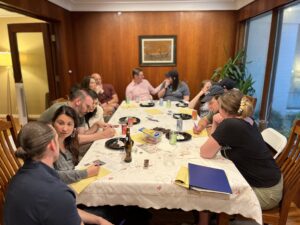
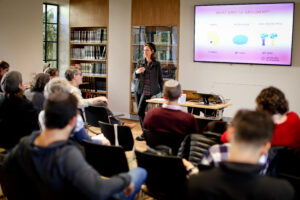 “More and more communities are reaching out looking for support and guidance,” said Dauber Sterne. “Conversations around Israel right now can either tear communities apart or strengthen connections and build mutual understanding. Educational leaders know they must engage in these conversations, and they want to—but doing it constructively and in a healthy manner takes an intentional approach and training.”
“More and more communities are reaching out looking for support and guidance,” said Dauber Sterne. “Conversations around Israel right now can either tear communities apart or strengthen connections and build mutual understanding. Educational leaders know they must engage in these conversations, and they want to—but doing it constructively and in a healthy manner takes an intentional approach and training.” 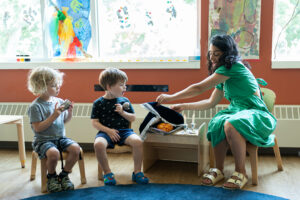 The three-year ElevatEd pilot focuses on 11-12 pioneer communities, with a goal of recruiting, training, and credentialing up to 30 educators in each community, amounting to more than 300 emerging early childhood educators in total. The five initial communities—Boston, Denver-Boulder, East Bay (California), Houston, and Long Island—will be joined by a
The three-year ElevatEd pilot focuses on 11-12 pioneer communities, with a goal of recruiting, training, and credentialing up to 30 educators in each community, amounting to more than 300 emerging early childhood educators in total. The five initial communities—Boston, Denver-Boulder, East Bay (California), Houston, and Long Island—will be joined by a  Jewish leaders and professionals across the country with skills to respond to flashpoint moments, build proactive relationships across lines of difference, strengthen Israel engagement, counter antisemitism, and build healthier and more resilient communities. RTT’s methodology is one of the most robust and effective approaches for facilitating challenging conversations in the country, recognized as best-in-class both within and beyond the Jewish world. By working closely with strategic partners such as Hillel International, Jews of Color Initiative, Foundation for Jewish Camp, rabbinical schools, Federations, BBYO, OneTable, Repair the World, Honeymoon Israel, and others, RTT is building a national field of trained facilitators and coaches to support productive discussion and inquiry on Israel and other important issues across Jewish life.
Jewish leaders and professionals across the country with skills to respond to flashpoint moments, build proactive relationships across lines of difference, strengthen Israel engagement, counter antisemitism, and build healthier and more resilient communities. RTT’s methodology is one of the most robust and effective approaches for facilitating challenging conversations in the country, recognized as best-in-class both within and beyond the Jewish world. By working closely with strategic partners such as Hillel International, Jews of Color Initiative, Foundation for Jewish Camp, rabbinical schools, Federations, BBYO, OneTable, Repair the World, Honeymoon Israel, and others, RTT is building a national field of trained facilitators and coaches to support productive discussion and inquiry on Israel and other important issues across Jewish life.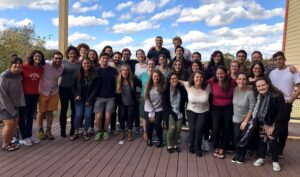 Given the tensions on college campuses, RTT’s partnership with Hillel has been especially important. Special training programs for Hillel staff—including facilitation training for mid-to-senior career Hillel professionals as well as early-career Hillel professionals—helped them facilitate student experiences to strengthen relationships and understanding across differences in this difficult year. Hillel International reports that next to increased security, Hillel professionals describe the tools RTT provides as their greatest need. Participating professionals were equipped with communication tools that helped them support Jewish students to feel less anxiety and trepidation when talking about Israel, antisemitism, and other charged topics; offer programs where Jewish students can feel safe to express what they’re experiencing and feel more strongly connected to Jewish life and to each other even across strongly differing perspectives; build trust with students who have felt alienated from Hillel in the past or during this time due to political differences; and navigate inter-group relationship-building with administrators, DEI departments, and non-Jewish student groups. As a result, on campuses where RTT has trained Hillel professionals over the past several years, students report relief and gratitude for the space to share their experiences and views on Israel and other tough issues, and to listen to their peers in turn. Hillel professionals report new and different students participating in Hillel programs, and improved relationships between Jewish and non-Jewish students even during moments of escalation
Given the tensions on college campuses, RTT’s partnership with Hillel has been especially important. Special training programs for Hillel staff—including facilitation training for mid-to-senior career Hillel professionals as well as early-career Hillel professionals—helped them facilitate student experiences to strengthen relationships and understanding across differences in this difficult year. Hillel International reports that next to increased security, Hillel professionals describe the tools RTT provides as their greatest need. Participating professionals were equipped with communication tools that helped them support Jewish students to feel less anxiety and trepidation when talking about Israel, antisemitism, and other charged topics; offer programs where Jewish students can feel safe to express what they’re experiencing and feel more strongly connected to Jewish life and to each other even across strongly differing perspectives; build trust with students who have felt alienated from Hillel in the past or during this time due to political differences; and navigate inter-group relationship-building with administrators, DEI departments, and non-Jewish student groups. As a result, on campuses where RTT has trained Hillel professionals over the past several years, students report relief and gratitude for the space to share their experiences and views on Israel and other tough issues, and to listen to their peers in turn. Hillel professionals report new and different students participating in Hillel programs, and improved relationships between Jewish and non-Jewish students even during moments of escalation coalitions, campuses, workplaces, and communities alike. This framework—crucial long before October 7th—will be ever more important to engage the next generation, combat polarization and hate, and ensure the resiliency of the Jewish community for years to come. RTT gives leaders the tools to address their deepest challenges while holding the difficulty and pain, building communal solidarity and care, and learning from people’s differences. With this approach, political differences evolve from a source of tension, anxiety, and alienation into an engine of communal health and cohesion.
coalitions, campuses, workplaces, and communities alike. This framework—crucial long before October 7th—will be ever more important to engage the next generation, combat polarization and hate, and ensure the resiliency of the Jewish community for years to come. RTT gives leaders the tools to address their deepest challenges while holding the difficulty and pain, building communal solidarity and care, and learning from people’s differences. With this approach, political differences evolve from a source of tension, anxiety, and alienation into an engine of communal health and cohesion.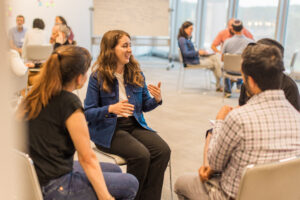 Atra helps rabbis learn how to engage people in new ways—both inside and outside of congregational walls—and strengthens connections among fellow clergy. More than 1,000 rabbis h
Atra helps rabbis learn how to engage people in new ways—both inside and outside of congregational walls—and strengthens connections among fellow clergy. More than 1,000 rabbis h communities’ needs and clearly define what excellent rabbinic leadership looks like. Key findings from Atra’s 2023 study showed that young American Jews want more experiences with rabbis because those interactions help them feel more spiritually connected and more connected to a Jewish community. Atra shared insights from the research about what factors make for positive interactions between young adults and rabbis, how these interactions help young adults feel more comfortable and confident being Jewish, and where rabbis can look to engage even more young people.
communities’ needs and clearly define what excellent rabbinic leadership looks like. Key findings from Atra’s 2023 study showed that young American Jews want more experiences with rabbis because those interactions help them feel more spiritually connected and more connected to a Jewish community. Atra shared insights from the research about what factors make for positive interactions between young adults and rabbis, how these interactions help young adults feel more comfortable and confident being Jewish, and where rabbis can look to engage even more young people.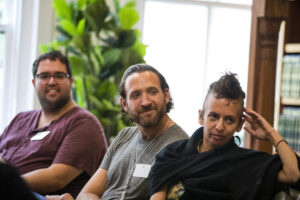 and in person, in hospitals and in recovery programs, in homes and in cafes, in Yeshivot and on street corners–everywhere that communities are found and built.
and in person, in hospitals and in recovery programs, in homes and in cafes, in Yeshivot and on street corners–everywhere that communities are found and built.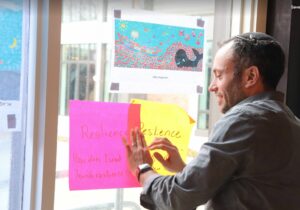 quality, meaningful, and engaging Yamim programs for students and communities.
quality, meaningful, and engaging Yamim programs for students and communities. In each Yamim training, M² crafted a deliberate and curated experience, from the design of the space – which was set up like an art gallery – to the balance between theoretical knowledge and hands-on work. Participants were introduced to the core idea of the training: using values to guide them through crafting the messages they want to convey in their commemorative ceremonies. The afternoon was dedicated to a lab session where participants crafted Yamim lesson plans, working collaboratively to brainstorm and test their ideas with each other. The centerpiece of the training was the Yamim Journal – a beautifully designed booklet curating about 100 different resources from both M² and other organizations, featuring lesson plans, art, media, music, conversation prompts and even step-by-step instructions for planning Yamim ceremonies. Participants said they appreciated its focus on art and poetry as points of entry for authentic discussions on difficult topics.
In each Yamim training, M² crafted a deliberate and curated experience, from the design of the space – which was set up like an art gallery – to the balance between theoretical knowledge and hands-on work. Participants were introduced to the core idea of the training: using values to guide them through crafting the messages they want to convey in their commemorative ceremonies. The afternoon was dedicated to a lab session where participants crafted Yamim lesson plans, working collaboratively to brainstorm and test their ideas with each other. The centerpiece of the training was the Yamim Journal – a beautifully designed booklet curating about 100 different resources from both M² and other organizations, featuring lesson plans, art, media, music, conversation prompts and even step-by-step instructions for planning Yamim ceremonies. Participants said they appreciated its focus on art and poetry as points of entry for authentic discussions on difficult topics.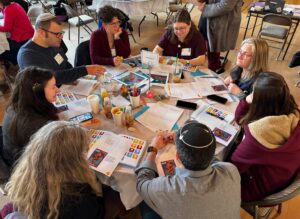 Participant
Participant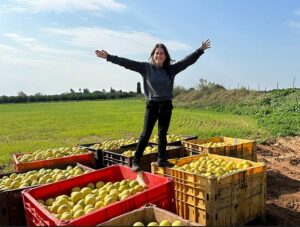 Birthright Israel educational components. This includes an orientation to prepare volunteers for their placements; Kiddush and Shabbat experiences; sessions where they can discuss and process their experiences, thoughts, and feelings; enrichment activities that provide respite, a sense of community, and mental release for the participants (including a workshop, a city tour, a meal at a restaurant, and other activities that support local businesses and the Israeli economy); a geopolitical lecture led by an expert with an overview and Q&A period; an activity with Israeli
Birthright Israel educational components. This includes an orientation to prepare volunteers for their placements; Kiddush and Shabbat experiences; sessions where they can discuss and process their experiences, thoughts, and feelings; enrichment activities that provide respite, a sense of community, and mental release for the participants (including a workshop, a city tour, a meal at a restaurant, and other activities that support local businesses and the Israeli economy); a geopolitical lecture led by an expert with an overview and Q&A period; an activity with Israeli 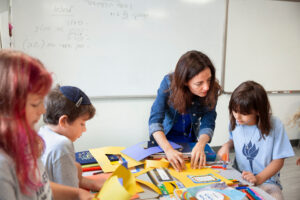 A key aim of the digest was to help the field improve its collective capacity to be smart consumers and users of research. All studies have limitations, and the digest illuminated those limitations without judgment. Interpreting sophisticated research for a general audience, and unpacking where data can and cannot be applied, aligns with CASJE’s mission to see research applied effectively. Examining study limitations in the digest also enabled the reader to answer critical questions: What do these findings mean for me and what I am trying to accomplish for the people I serve, in this place where they are, at this time that we’re in, and with the resources I have. To that end, CASJE also shared a discussion guide in each digest for use with colleagues to frame discussion about the featured studies and their applicability in various Jewish communal settings.
A key aim of the digest was to help the field improve its collective capacity to be smart consumers and users of research. All studies have limitations, and the digest illuminated those limitations without judgment. Interpreting sophisticated research for a general audience, and unpacking where data can and cannot be applied, aligns with CASJE’s mission to see research applied effectively. Examining study limitations in the digest also enabled the reader to answer critical questions: What do these findings mean for me and what I am trying to accomplish for the people I serve, in this place where they are, at this time that we’re in, and with the resources I have. To that end, CASJE also shared a discussion guide in each digest for use with colleagues to frame discussion about the featured studies and their applicability in various Jewish communal settings.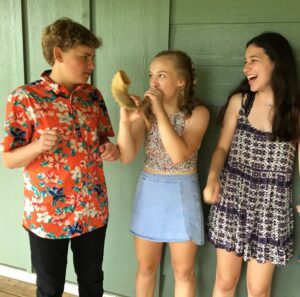 outcomes. These grants are intended to stimulate research that investigates Jewish education and its effects, and that is well-positioned to inform practice. Previous Small Grants projects have investigated learning across the wide variety of settings where Jewish education happens and focus on learners of any age across the lifespan. Other current CASJE projects include its
outcomes. These grants are intended to stimulate research that investigates Jewish education and its effects, and that is well-positioned to inform practice. Previous Small Grants projects have investigated learning across the wide variety of settings where Jewish education happens and focus on learners of any age across the lifespan. Other current CASJE projects include its 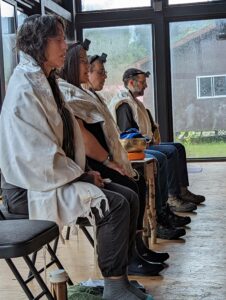 Of the more than 10,000 people IJS engages annually through its programs and resources, 90 percent of participants say that IJS supports their learning and growth. Eighty-eight percent express interest in further developing their Jewish spiritual practices.
Of the more than 10,000 people IJS engages annually through its programs and resources, 90 percent of participants say that IJS supports their learning and growth. Eighty-eight percent express interest in further developing their Jewish spiritual practices. 